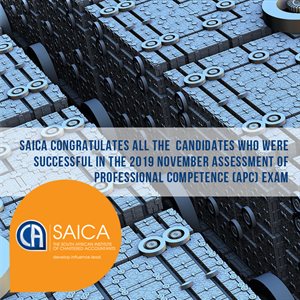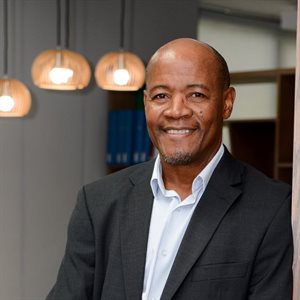
Top stories





Marketing & MediaWarner Bros. was “nice to have” but not at any price, says Netflix
Karabo Ledwaba 1 day

More news

Logistics & Transport
Maersk reroutes sailings around Africa amid Red Sea constraints

















“SAICA would like to congratulate the cohort of 2019 for their dedication and determination in applying themselves to the rigorous professional requirements of the APC. In many ways this is the toughest exam because it requires aspirant Chartered Accountants [{CAs(SA)] to apply their technical academic knowledge from multiple disciplines to a single but complex real-life business case study. To pass, candidates must demonstrate high levels of the skills employers have told us they want in the next generation of CAs(SA),” said Freeman Nomvalo, CEO of SAICA.
“Succeeding at this final test of professional competence requires advanced levels of critical thinking, the ability to work with technology, and the capacity to assimilate new information under pressure over a five-day period which culminates in an eight-hour assessment. It’s gruelling but it’s exactly the kind of challenge successful candidates will soon face as qualified CAs(SA),” added Nomvalo.
A recent analysis of the transformation efforts that began in 2002 to make the membership of the chartered accountancy profession more diverse, reveals that African membership, under the age of 35, has significantly increased from 3% in 2002 to 25% in 2020. (See detailed charts in Notes to Editor).
While the total number of candidates that sat the 2019 assessment increased by 17.2%, SAICA noted with concern that the overall pass rate decreased by 12%.
| By Race | 2019 | 2018 | Decrease in pass rate (2018 to 2019) | |||||||||
| FAIL | PASS | TOTAL | % PASS | FAIL | PASS | TOTAL | % PASS | |||||
| Indian | 169 | 327 | 496 | 66% | 103 | 358 | 461 | 78% | -12% | |||
| African | 934 | 705 | 1639 | 43% | 638 | 581 | 1219 | 48% | -5% | |||
| Coloured | 102 | 104 | 206 | 50% | 58 | 154 | 212 | 73% | -22% | |||
| Race not disclosed | 1 | 2 | 3 | 67% | 0 | 3 | 3 | 100% | -33% | |||
| White | 330 | 886 | 1216 | 73% | 158 | 984 | 1142 | 86% | -13% | |||
| Grand Total | 1536 | 2024 | 3560 | 57% | 957 | 2080 | 3037 | 68% | -12% |

Nomvalo said: “While we are encouraged to see how the profession’s transformation efforts have translated into more African and female candidates sitting the APC, we must raise our concern about the decline in the overall pass rate. We appeal to unsuccessful candidates not to give up, but to re-enrol for next year’s exam. Many CAs(SA) do not pass at their first attempt but go on to have highly successful and rewarding careers. I would like to specifically mention the two candidates who did not give up and overcame numerous obstacles to pass the APC on their 6th attempt. They exemplify the spirit of perseverance, and never giving up on their dreams.”
“As SAICA we will intensify our collaborative efforts to work with all our stakeholders in the education value chain, from schools through to training offices, to develop new and repeat candidates for solving real-world scenarios at the standard required to become a CA(SA),” committed Nomvalo.
On releasing the results SAICA also highlighted 12 candidates who earned a place on the institute’s prestigious APC Honours Roll. The roll is made up of candidates who demonstrate exceptional performance and show the greatest insight into the way they complete the case study tasks. Those candidates, in alphabetical order (by surname), are:
| Name | Surname | Training Office | Professional Provider Programme |
| Ahmed | Ally | Deloitte | APT |
| Robert | Anderson | Nedbank | APT |
| Simon | Basson | KPMG | APT |
| Mari-Louise | Boshoff | Deloitte | APT |
| Ryan | Brain | EY | UCT |
| Helen | Denny | PwC | APT |
| Eduard | du Plessis | Deloitte | UCT |
| Charne | Ferreira | PwC | APT |
| Kyle | Pillay | EY | UCT |
| Jani | Rademeyer | BDO | APT |
| Christin | Thomas | Deloitte | UCT |
| Francois | van der Merwe | PKF | APT |
SAICA’s commitment to its members and the public is that the CA(SA) designation is of the highest standard of excellence, able to meet the demands of the future market, driven by the skills of the 21st century. With this in mind, SAICA has implemented a number of interventions including more detailed analysis, candidate surveys and engagement with key stakeholders. Among others, these engagements led to:
Additional interventions to support SAICA’s intent to develop the candidates’ beyond being able to demonstrate their pure technical ability - in order to ensure the candidates’ ongoing relevance - were put in place at specific firms. In addition, academic programme providers were consulted to assess what they could do differently within the academic programme, to further develop relevant aspects of professional competencies earlier in response to the growing complexity of the demands within the accounting profession and business.
“These long term interventions, however, will take time to reach fruition. The skills required to be demonstrated in the APC, and expected in business today, cannot be developed overnight. There needs to be interventions across the candidates’ entire professional development journey from when they start their undergraduate qualification until they complete all requirements for becoming a CA(SA),” concluded Nomvalo.
Detailed statistics can be found on the SAICA website: www.saica.co.za.